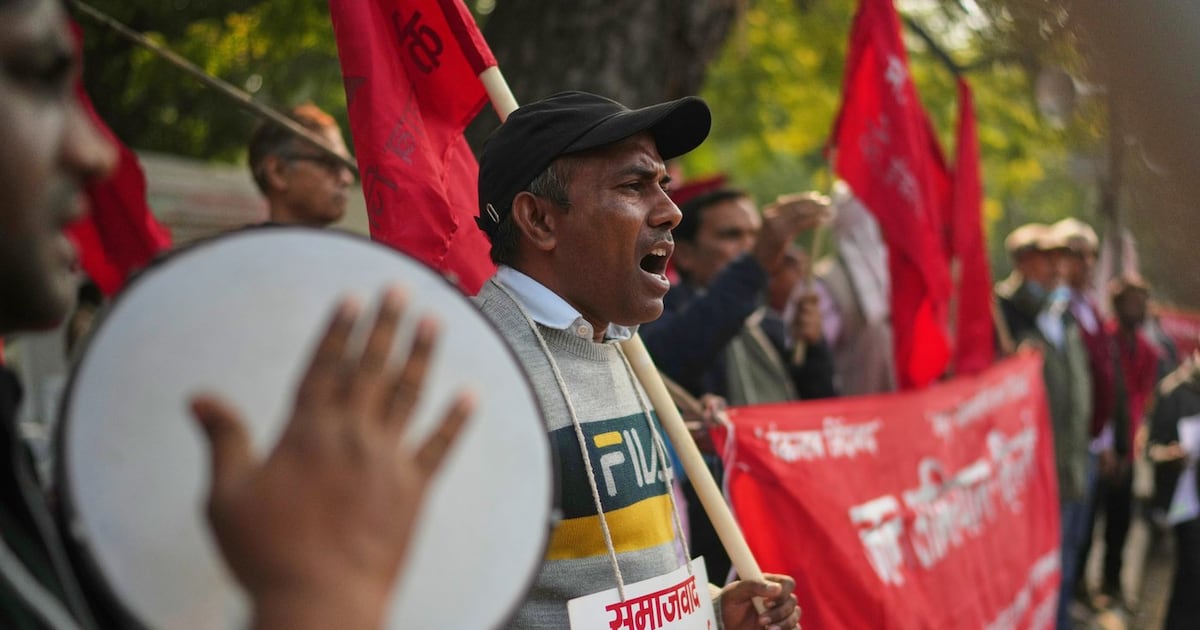Politics
Indian Trade Unions Mobilize Nationwide Protests Against Labour Codes

A coalition of 10 major Indian trade unions organized nationwide protests on October 11, 2023, against the implementation of new labour codes, which they claim undermine workers’ rights. Demonstrations occurred in various regions, as unions representing millions of workers and farmers rallied against what they termed “deceptive fraud” aimed at eroding job security and weakening collective bargaining.
This protest marks the first coordinated labour action since the new codes took effect, highlighting ongoing tensions between the unions and the government regarding economic reforms. The government asserts that these changes will modernize outdated laws, improve operational efficiency, and expand social protections for workers. However, union leaders argue that the reforms primarily benefit employers and contribute to escalating job insecurity.
Concerns Over Job Security and Workers’ Rights
In a statement, Tapan Sen, general secretary of the Centre of Indian Trade Unions, emphasized the adverse effects of the new framework, saying, “Workers’ rights are being bulldozed, and the government is justifying the move with a barrage of lies that the codes will benefit labourers.”
The new framework consolidates four codes—covering wages, industrial relations, social security, and occupational safety—replacing 29 existing labour laws that governed hiring and workplace standards across both formal and informal sectors in India. The government argues that this consolidation simplifies compliance and provides better access to social security and safety regulations for workers.
Key provisions of the new codes include mandatory appointment letters for employees and a defined timeframe for salary payments. Additionally, the reforms allow women to work night shifts under secure conditions established by employers. Benefits have also been extended to the unorganized sector and gig workers, while fixed-term employees are set to receive the same protections as permanent workers, such as leave and maternity benefits.
Union Leaders Criticize Employer-Focused Reforms
Despite these assurances, union representatives express profound dissatisfaction with the implementation of the codes. They highlight provisions that facilitate easy layoffs for larger companies, expand fixed-term employment, and impose stricter conditions regarding union formation and strike actions. Amarjeet Kaur, general secretary of the All India Trade Union Congress, criticized the reforms, stating, “It’s an attempt to push workers back to the colonial era where they can’t even raise their voice nor fight to form or legalize a trade union.”
While the government has yet to respond formally to the protests, it typically dismisses union claims. Officials defend the codes as essential for attracting investment and increasing formal job opportunities. By modernizing labour laws, the government aims to encourage companies to expand operations, which they believe will ultimately enhance job security.
As the protests unfold, the future of India’s labour landscape remains uncertain, with unions committed to challenging what they perceive as a rollback of hard-won workers’ rights. The ongoing debate reflects broader concerns about economic reforms and their impact on the workforce.
-

 Politics3 weeks ago
Politics3 weeks agoSecwepemc First Nation Seeks Aboriginal Title Over Kamloops Area
-

 World4 months ago
World4 months agoScientists Unearth Ancient Antarctic Ice to Unlock Climate Secrets
-

 Entertainment5 months ago
Entertainment5 months agoTrump and McCormick to Announce $70 Billion Energy Investments
-

 Lifestyle4 months ago
Lifestyle4 months agoTransLink Launches Food Truck Program to Boost Revenue in Vancouver
-

 Science5 months ago
Science5 months agoFour Astronauts Return to Earth After International Space Station Mission
-

 Technology3 months ago
Technology3 months agoApple Notes Enhances Functionality with Markdown Support in macOS 26
-

 Top Stories2 months ago
Top Stories2 months agoUrgent Update: Fatal Crash on Highway 99 Claims Life of Pitt Meadows Man
-

 Lifestyle3 months ago
Lifestyle3 months agoManitoba’s Burger Champion Shines Again Amid Dining Innovations
-

 Politics4 months ago
Politics4 months agoUkrainian Tennis Star Elina Svitolina Faces Death Threats Online
-

 Sports5 months ago
Sports5 months agoSearch Underway for Missing Hunter Amid Hokkaido Bear Emergency
-

 Politics4 months ago
Politics4 months agoCarney Engages First Nations Leaders at Development Law Summit
-

 Technology5 months ago
Technology5 months agoFrosthaven Launches Early Access on July 31, 2025





















